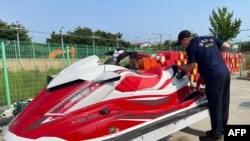A Chinese dissident who fled across the Yellow Sea on a Jet Ski-style watercraft is free in South Korea after three months in detention, at least for now.
A South Korean court on Thursday sentenced Kwon Pyong, 35, to one year in prison for entering the country illegally but suspended the sentence for two years, effectively ending his detention.
Kwon’s request for asylum in South Korea is still pending, meaning he still faces the threat of being deported to China if his request is rejected. He has also asked to be permitted to seek asylum in a third country if he cannot stay in South Korea.
Kwon, held in Incheon detention center for the past three months, arrived on the Korean coastline on the night of August 16 after a 300-kilometer sea crossing from the Chinese province of Shandong.
He was wearing a life jacket and helmet and was equipped with binoculars and a compass when he was found. He told authorities he had towed five barrels of fuel behind him in order to complete the long voyage.
Kwon previously served 18 months in prison in China after being convicted of "inciting subversion of state power" in 2017 and was still subject to an exit ban when he fled China. His crime was protesting against Chinese leader Xi Jinping by wearing a T-shirt emblazoned with satirical nicknames for the communist leader.
Gu Yi, a Chinese activist and doctoral student at the University of Georgia who said he knows Kwon, told VOA's Mandarin Service that South Korea had come under pressure from Beijing to deal harshly with Kwon. He urged South Korea to allow his friend to seek asylum in a third country.
"Although Kwon has been temporarily released, he is still far from true freedom,” Gu said. “Originally, according to Article 31 of the Convention on the Status of Refugees, signed by South Korea, Kwon should not be punished for illegal entry as an asylum-seeker.
“But South Korea has been under tremendous pressure from Beijing from the beginning. … I hope it will allow Kwon to go to a third country that will accept him."
According to Yonhap News Agency, the court ruled that Kwon had attempted to enter the country illegally and had dumped waste into the sea.
Quan He, Kwon's father, told The Guardian in an interview that his son was “an honest and sincere” person who began to question China’s one-party rule after studying aerospace engineering in the United States, where he graduated from Iowa State University in 2012.
The father said he hoped that the Korean government could give his son “a way to live."
At a preliminary hearing last month, Kwon told the judge, "I did not secretly enter South Korea to damage buildings or violate the law. After I was sentenced in China, I lived without freedom and could not leave the country in a normal way."
South Korea provides asylum to only a small number of refugees each year. It has taken in fewer than 4,000 asylum-seekers over the past 20 years, mostly from Yemen and Syria.
VOA reached out to both the Chinese and South Korean embassies in the United States for comments and had not received any response by publication.
Adrianna Zhang contributed to this report.
